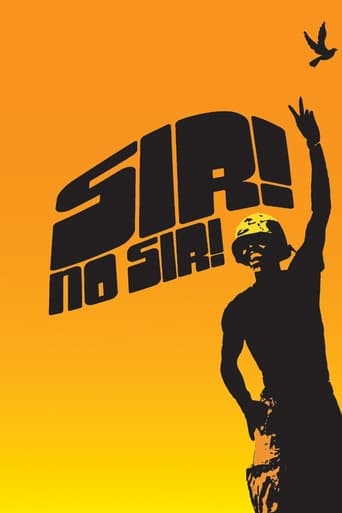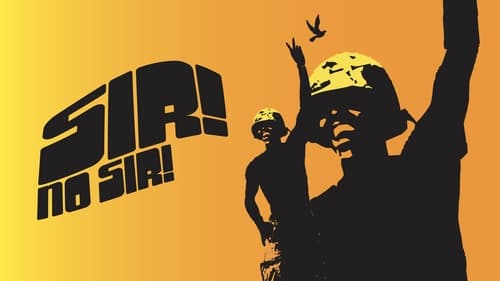valis1949
SIR! NO SIR! demonstrates the unbelievable scope and power of the anti- war movement within all branches of the American military during the Vietnam War era. This documentary serves as a reminder for those of us who lived through this turbulent period of American history, and provides a cogent and factual historical record for those who were not yet born. Contemporary American pundits on the Far Right would like to see these truths silenced...permanently. The film shows that anti-war sentiment and anti-war activity permeated all sectors within the American Military establishment, and many brave men sacrificed their careers, and their very lives to stop our country's unnecessary and immoral war in South East Asia. One thing that struck me while watching the film, is that today, huge media conglomerates are being owned and operated by fewer individuals and groups, and how easy it has become to suppress and distort America's long history of dissent. These days, any critical examination of this country's involvement in foreign entanglements is perceived as disloyalty to the troops. Nothing can be farther from the truth, and SIR! NO SIR! shows that the genesis of this particular heresy began in the 1960's as those in power attempted to silence opposition to one of America's most unpopular wars. The film also boasted many Special Features which helped to reaffirm the theme that there was a concerted and intelligent opposition to the war in Vietnam , and this view was shared by a significant portion of this nation's fighting forces. Great film.
marta2046
I thought I knew a lot about the Vietnam War protest movement, but obviously, not enough.I knew some soldiers had thrown their medals on the congressional steps and gone to peace marches, but not that thousands of American soldiers were actively involved in ending the war from within. And not because they were afraid to die or get hurt, but because they realized that the Vietnam War was immoral, illegal and they were killing people in a country who had never done anything against the United States THEY are the ones who deserve most of the credit for stopping the Vietnam war, not the civilians at home. The soldiers risked beatings, imprisonment and even death to protest the lies and atrocities of the Vietnam war, not for financial gain or glory, but to preserve their sense of morality. They showed true bravery--saying "NO MORE!" and were able to stop the bloodshed--for at least a few years. Thanks, guys!!!! This documentary also discusses the lie spread by right-wingers that protesters spit on returning soldiers, even ones on stretchers. A former Vietnam Vet investigated it thoroughly-- it DID NOT happen! Every American soldier in Iraq should see this. It's from the mouths of thousands of their own.On a technical level: The rare vintage footage is mastered at a very high level--audio is clean and clear. Interesting soundtrack, not the "Oldies" I'd expected, but modern, edgy--which was the perfect choice.And, oh, yeah, just in case you don't get the message from the cover, this is not a pro-con view of the Vietnam War. This film is definitely Anti-war.
dsallen-2
Did any of you see this film? It was moving and spectacular. How can you compare it to a Michael Moore film? It is all about veterans and contains countless interviews with veterans and is an accurate portrayal of veterans who opposed the Vietnam War. These men risked their lives defending your sorry asses, and all you can do is condemn them as Hollywood liberals. Jane Fonda and Donald Sutherland are not the focus of this film; it's about the men who fought in Vietnam and then opposed the war, in Vietnam and at home. Not only are they war heroes, they are also champions of free speech and civil rights. I highly recommend this film.
roland-104
By 1968 the civilian anti-Vietnam war movement was beginning to expand, young men were escaping to Canada to avoid the draft, and former combatants were starting to protest the war. Like most Americans, I had no idea that at the same time there was a snowballing anti-war movement taking place right within the ranks of active duty military personnel.Awareness of the disconnect between Pentagon and White House rhetoric, on the one hand, and realities on the ground in Vietnam, on the other, especially our massive extermination of civilian lives, began to seep through every pore within the military, prompting protests that were strikingly varied, creative, and, while often made up of small, localized actions, collectively impressive. To the point that by 1971, as one army colonel put it, the active GI anti-war rebellion had "infested the entire armed services." David Zeiger, writing and directing his first feature for the big screen, does a splendid job of pulling together the stories of participants in this unprecedented, diffuse, largely unorganized, multicentered movement. There are plenty of talking heads, but they aren't experts, they're people reminiscing today about their personal antiwar activities 35 years ago while on active duty. (We also see old shots of these same people when they were young and in uniform.) We hear from participants in actions as diverse as the following examples indicate: Proliferation of forbidden antiwar newspapers on military bases; Passive refusal to participate in antiriot actions at the 1968 Chicago Democratic Party Presidential Convention; Boycott of a chain of jewelry stores located near military bases that pandered to men about to go to Vietnam (Their selling point: the prospect of dying in Vietnam made it urgent to buy a bauble for your wife or mother now, before you go. The ads were juxtaposed with photos of soldiers who had recently died).And more: An Air Force Intelligence group based in Thailand that refused to transmit further intelligence because it was being used as a basis for undisclosed Cambodian bombings; A group of active duty Army personnel that swore not to fight, rioting after their mass arrest and incarceration in an overcrowded Army stockade; A physician - a dermatologist - who refused to continue training Special Forces medics to treat skin infections of Vietnamese children – part of a "win the hearts and minds" campaign – once he learned that we were killing untold thousands of civilians by napalm bombing of villages; Pilots refusing to fly bombing raids; The first major mass public testimony by former combatants about atrocities against civilians, at a 3-day conclave in 1971, in Detroit (memorialized in the film, "Winter Soldier").These stories and many others are told here, involving officers as well as grunts, from every branch of the service. What is so compelling is that the passion of these people has not ebbed despite all the years that have passed, and the many sacrifices and punishments they absorbed consequent to taking a stand. Perhaps there are also people out there who stood up against the war from within the ranks and later regretted doing so. We don't meet any of them.We do meet Jane Fonda, who reminisces with evident conviction today, about her participation, along with Donald Sutherland and other entertainers, in the unauthorized "FTA" variety shows they conducted near military bases during the Vietnam war, antiwar shows that roused huge crowds as they mocked the Bob Hope tours.The men and women – inside the military and among civilians throughout this country – who bravely spoke truth to power during and after the Vietnam war gave the U.S. peace movement its best opportunity since the Civil War to acknowledge the costs of war and seek a better way. Western Europe figured it out. But we didn't. Lessons learned became lessons lost. And, God help us, look where we are today. My grade: 8/10 B+.





